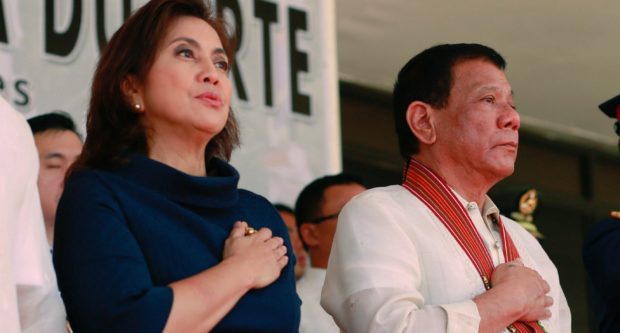Draft charter cuts terms of Duterte and Robredo

President Rodrigo Duterte and Vice President Leni Robredo sing the national anthem during the 38th Philippine National Police Academy (PNPA) Commencement Exercises for “Masidlak” Class of 2017 at Camp General Mariano N. Castañeda in Silang, Cavite on March 24, 2017. (File photo by KING RODRIGUEZ / Presidential Photographers Division)
The terms of President Rodrigo Duterte and Vice President Leni Robredo would not only be cut but they would also be barred from seeking reelection under the proposed federal constitution.
According to the revised draft of the proposed Charter released on Tuesday, the President has to call elections for a “transition president” and a “transition vice president” within six months of the people’s ratification of the new Constitution in a plebiscite.
The revision to the transitory provisions of the so-called Bayanihan Constitution drawn up by Malacañang’s Consultative Committee states that the terms of the President and Vice President will not be extended beyond June 30, 2022, and that they cannot seek reelection in the May 2022 elections.
The 22-member committee headed by former Chief Justice Reynato Puno revised the transitory provisions on the President’s request.
Last week, the President asked the Puno committee to cut his term and provide for the election of transitional leaders who will oversee the shift to federalism during the next four years, or up to 2022.
The President endorsed the original draft submitted by the committee on July 9, but said, according to presidential spokesperson Harry Roque, he would want to step down before the end of his term because he was old and tired.
On Tuesday, Malacañang thanked the Puno committee for accommodating the President’s request.
Roque said the revision should put to rest speculation that the President had ulterior motives in pushing for federalism.
“We thank the consultative committee for accommodating the President’s request to provide for an elected transition president,” Roque said in a statement.
“This should allay all fears that the President has other motives for wanting to shift to a federal form of government,” he added.
According to the new draft, the transitional president and vice president, who have to be elected together, would serve the remainder of Duterte’s and Robredo’s terms until June 30, 2022.
The revision, however, does not bar them from running as transitional leaders.
Transitional body
“The Vice President may run if she wishes to, but not the incumbent President,” consultative commission spokesperson Conrado Generoso told reporters on Tuesday, ahead of the commission’s appearance in a Senate public hearing.
The transitional president would chair the proposed Federal Transition Commission, which would formulate the plan and promulgate all orders for the establishment of a federal government and the governments of the federated regions by 2022.
The transitional president will appoint 10 regular members, while the transitional vice president, Senate president, House speaker and the country’s past presidents will be ex-officio members.
During the transition, all government officials under the 1987 Constitution will “continue to hold office unless removed by reason of reorganization.”
Permanent government employees who are terminated as a result of the restructuring will be given separation or retirement pay or considered for transfer to other government posts.
Temporary government employees are not guaranteed transfer or separation pay since the proposed Constitution merely says they will “be given such benefits as may be provided in the transition plan.”
The Puno committee has proposed to transform the present 17 regions and the defunct Negros island region into federated regions, despite recommendations for only eight to 12 federated regions so these would be economically viable.
Federal capital
The National Capital Region, where government decision-making powers and economic activity have been centralized, would be a federated region.
Generoso earlier said another body should do a “deeper and more comprehensive study” of the financial side of the shift to federalism because the Bureau of Internal Revenue provided only estimates of the possible revenues for each of the 18 regions.
The committee has proposed giving a bigger share of the national revenue, which reached around P3 trillion last year, to the federated regions.
In its proposed power-sharing and revenue-sharing setup, the committee estimated that each region will control an average P60 billion in revenue.
The bulk of the national revenue, however, will go to the federal government. —With a report from Julie M. Aurelio














